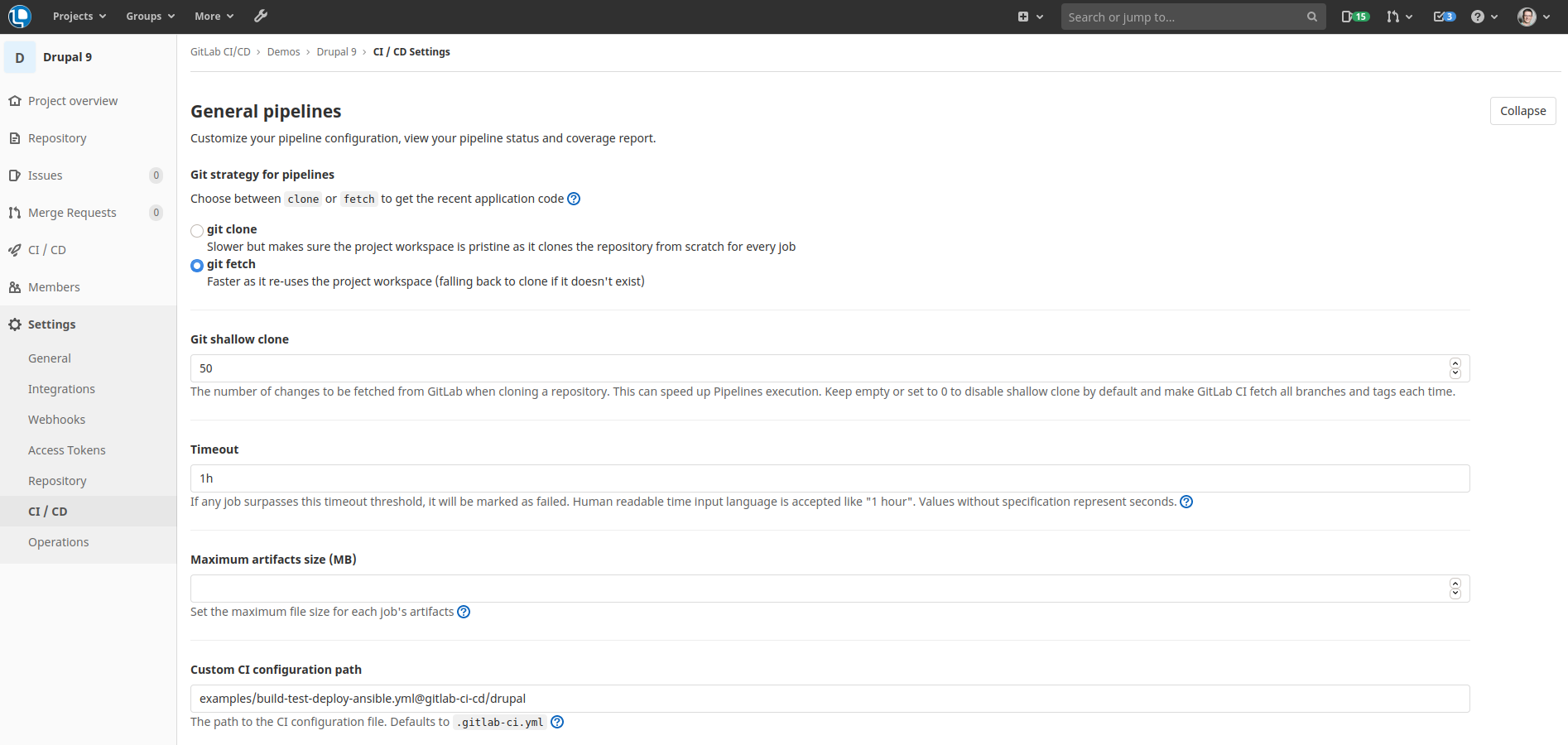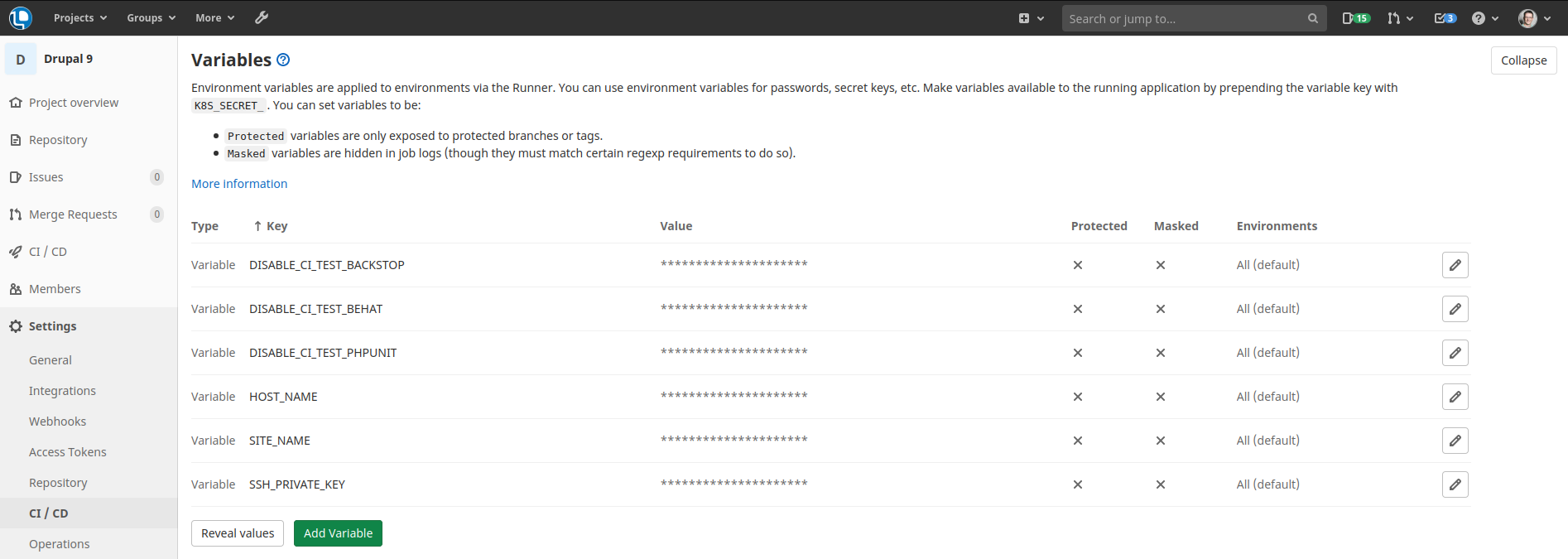Configuration¶
GitLab Runner¶
To setup a GitLab runner, they need to be
installed first - see also our
Ansible role. Then go to the Drupal project
on GitLab into Settings / CI/CD / Runners and follow the instructions
there. Make sure that the runner gets tagged with default in GitLab.
As a result, a file /etc/gitlab-runner/config.toml get created and this
should be edited to look like this:
1 2 3 4 5 6 7 8 9 10 11 12 13 14 15 16 17 18 | |
The image is tagged for the PHP version the project uses. For projects with
different PHP versions a different GitLab runner should be configured or the
image being overwritten for each task in the .gitlab-ci.yml of the respective
project.
GitLab Variables¶
Some variables are required for proper access control, and you have to provide them in the project configuration by going to Settings / CI/CD / Variables and adding these variables:
SSH_PRIVATE_KEY: A private key being generated elsewhere just for this purpose. This is necessary for cloning private Git repositories.GITLAB_ACCESS_TOKEN: For authenticating with the LakeDrops Gitlab package repository, you have to create an access tokeb for the user who runs the pipeline and provide it in this variable.
GitLab CI instructions in Drupal project¶
The Drupal project should be setup with the
Drupal Development Environment
composer plugin and then get a .gitlab-ci.yml file for the pipeline
configuration:
1 2 3 4 5 6 7 8 9 10 11 12 13 | |
The tasks for downloading the database dump and to deploy the site finally, depend on your hosting environment and have not been generalized, unless you're using our Ansible environment too, then please refer to Using Ansible to Dump DB and Using Ansible for Deployment below. Otherwise, you have to write the scripts for those two tasks yourselves.
Variables¶
COMPOSE_PROJECT_NAME: a string only unique project name which will be used to identify caches and Docker containers.HOST_NAME: the host name where you want to deploy your Drupal siteENVIRONMENT_NAME: the environment name for the GitLab UI.ENVIRONMENT_URL: the environment url of your websiteTHEME_BASE_PATH: the relative patch to the base theme, if you want to use oneTHEME_CSS_PATH: the relative path to the theme's css path where the generated artefact can be found.PHP_VERSION: '8.3': the string representation of the PHP versionPHP_MAJOR_VERSION: the major PHP version, defaults to 8.PHP_MINOR_VERSION: the minor PHP version, default to 3.COMPOSER_DOWNGRADE: by default, composer 2 is being used. To use composer 1 instead, set this variable to 1.INITIAL_INSTALL: if set toyes, the initial Drupal site installation gets triggered and all DB and test tasks will be skipped. Can also be used as[INITIAL_INSTALL]in the Git commit message.PULL_DB: if set toyes, the download of a fresh database dump will be forced, regardless of any other conditions. Can also be used as[PULL_DB]in the Git commit message.DISABLE_CI_TESTS: if this variable is set to any value, the tasks in the test stage will be skipped. This is useful e.g. in a development environment where you push and run pipelines often but don't want to run the tests every single time.$DISABLE_GITLAB_CI_TESTS: if this variable is set to "1", no GitLab Tests will be executed, see: GitLab Templates.DISABLE_CI_TEST_BACKSTOP: if this variable is set to any value, the visual regression tests with Backstop will be skipped.DISABLE_CI_TEST_BEHAT: if this variable is set to any value, the Behat tests will be skipped.DISABLE_CI_TEST_CODESTYLE: if this variable is set to any value, the PHP CS tests will be skipped.DISABLE_CI_TEST_CYPRESSE2E:: if this variable is set to any value, the Cypress tests will be skipped.DISABLE_CI_TEST_PHPUNIT: if this variable is set to any value, the PHP unit tests will be skipped.CAE: This variable is being used by the Drupal module Config auto exportRESET_LOCALE: if set toyes, the interface translations will be wiped completely and built from scratch. Can also be used as[RESET_LOCALE]in the Git commit message.
Usage¶
This chapter is incomplete so far and needs more attention.
Initial installation of a Drupal site¶
This pipeline covers both, the initial installation and later updates of a Drupal site. The latter is the default, because it happens regularly whereas the initial installation only happens once.
Therefore, if you run the pipeline the first time to initially install the
Drupal site, either add [INITIAL_INSTALL] to your commit message or define
the variable INITIAL_INSTALL with the value yes when triggering the
pipeline from the GitLab UI.
When either of these conditions apply, no database will be downloaded, imported or updated and all tests will be skipped.
Handling of the database¶
To build and test your Drupal site prior to deployment, a database with content for this project is required and this is handled by the pipeline pretty smart.
First, it needs to be decided, if a fresh dump of the database needs to be collected or if the already existing database from the previous pipeline run can be re-used. Here is how the prepared pipelines make that decision:
A fresh database is being pulled if one of the following conditions apply, tested in the given order:
- if the pipeline run for the master branch
- if the commit message contains the string
[PULL_DB] - if the variable
PULL_DBis set toyes - if no database container from a previous pipeline exists
- if the database from the previous pipeline doesn't contain any user data yet
If a new database is required, the task Download DB in the build stage will
create a dump and make it available as an artifact for subsequent tasks. The
task Import DB will then import that dump in the prepare stage.
Otherwise, those two tasks will be skipped and the task Update DB will be
executed in the prepare stage instead.
Example¶
We provide a Demo Drupal 10 project which uses this GitLab CI framework. If you want to give it a try, login to our GitLab, go to the project and click on "Request access". Once we've accepted your request, you can clone the project, make some changes and push them back to the project. This will trigger the pipeline then you can watch running.
The deployed demo site is available online.
The setup for this project is very simple. Because we wanted to protect the
pipeline configuration, we removed the default .gitlab-ci.yml file from
the repository and configured the usage of the example pipeline configuration
that you can review in the Drupal GitLab CI Project.

Also, all the variables have been configured in the GitLab project settings, because developers should not have access to them:

GitLab CI for a single Drupal module¶
For building and testing a single Drupal.org, custom or contrib module, we make use of the official Drupal project
GitLab Templates. To include the templates, we provide a
GitLab CI file private-modules,
which can be included in your own gitlab-ci.yml file.
This includes the following stages:
- build
- validate
- test
To get a complete documentation for this powerful project, see here.
This file private-modules.yml includes another CI template called
composer-packages.yml.
Here you can store your module as a composer package in your own GitLab installation. The versioning is also included.
Now you can use it in a composer.json file. You have to define the repository like this:
1 2 3 4 | |